Ahead of the Academy Awards, we’ve reviewed every short film in each category: Animation, Documentary, and Live Action.
Animation
Affairs of the Art | UK/Canada | 16 MINS
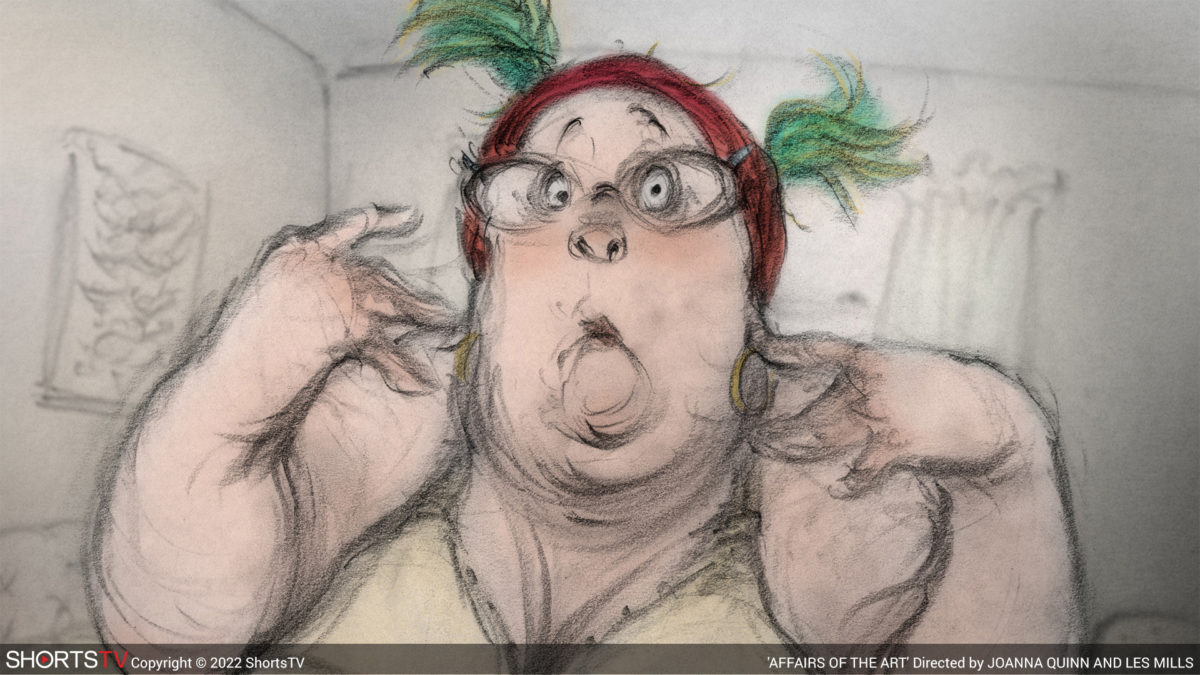
Fifteen years after the character’s last foray (Dreams & Desires: Family Ties) and 35 years since her debut in Girls Night Out, everyone’s favorite Welsh housewife Beryl (Menna Trussler) is back to narrate a series of anecdotes centered upon her eccentric family while pursuing a new obsession: hyper-futurism. The original team of Joanna Quinn (director and animator) and Les Mills (writer) takes us behind the scenes of their star’s art by showcasing the tireless support of her husband (walking up and down the stairs nude) and her full-tilt embracement of her own body as a paintbrush. More than just her creations and the hoops she puts people through to create them, however, Affairs of the Art seeks to remind us that artistic creation possesses no defined boundaries.
Is her sister Bev (Quinn) any less an artist with her passion for taxidermy or affinity for plastic surgery, making her biology her canvas? What about her son Colin’s (Brendan Charleson) creations in pursuit of his evolving passions for odds and ends like screw threads and birds—the latter of which involves him in a plot to avenge a pet’s death with murder? When art is involved everything becomes fair game—no matter how morbid (a tale of Bev spending hours with a dead body), X-rated (Beryl attempting to fit in an “uplift bra”), or absurd (mocking the family for going overboard while using a brush to apply blue paint to her entire body). Quinn and Mills take that to heart, pushing these characters into increasingly wild scenarios.
No matter how entertaining the hijinks, the draw is the animation. This 16-minute film is hand-drawn on paper before being scanned into a computer for coloring and compositing. Its rough, sketchy nature lends a personal touch CGI cannot replicate, the organic movements and embellishments rendered with meticulous care right down to the apparently genetic buck-tooth appearance of Beryl’s so-called menagerie of “geeks.” The mixture of love and disgust and jealousy and admiration for each of this factory worker-turned-artiste’s journeys back in time delivers an energetic atmosphere of uncertainty; we’re never sure just how far Quinn and Mills will take this crew’s child and adult forms for a laugh. The answer, of course, is: as far as necessary. Their dedication to the bit knows no bounds.
B
Bestia | Chile | 16 MINS
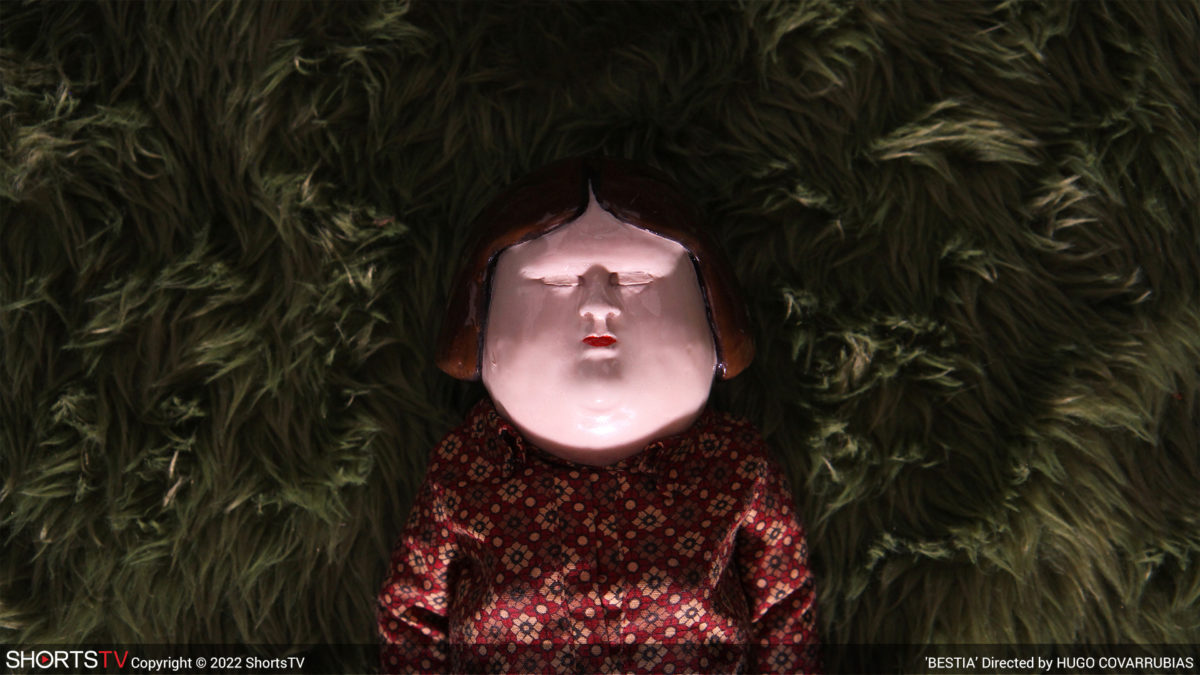
Her name was Íngrid Olderöck, otherwise known as “The Woman with the Dogs.” A Carabineros de Chile officer turned National Intelligence Directorate (DINA) agent under Augusto Pinochet, she received the nickname due to having trained a German Shepherd to sexually abuse and rape political prisoners of the regime in a middle-class neighborhood home coined the “Sexy Bandage.” She would later desert and fall victim to an assassination attempt led by the Movement of the Revolutionary Left (MIR) despite always assuming the hit was orchestrated by the Carabineros itself. She’d survive, claim madness with the bullet still lodged in her head, and ultimately die in 2001 of a digestive hemorrhage without ever facing charges for the human-rights violations committed in the 1970s. She is the Bestia [Beast].
Directed by Hugo Covarrubias and co-written with Martín Erazo, this animated short seeks to address the darkness of Chile’s past by giving Olderöck’s boogeywoman form with an emotionless porcelain doll. The stop-motion animation aesthetic is absolutely stunning with the glossy sheen of heads and hands juxtaposed against rough cardboard sets and canvas bodies. Our first glimpse of her historical monster comes inside an airplane, the camera creeping closer and closer to the cracked hole at her temple until we’re transported back through nightmares, memories, and fantasies. Outdoor scenes playing fetch with her dog Volodia make way for bloody decapitations, bestiality (with the help of fruit preserves), and foreboding ghosts lingering in the distance with blank faces devoid of features. It’s some truly disquieting stuff.
Part national-identity catharsis, part political diatribe, Covarrubias takes us through the psychological struggles of an infamous tormentor in ways that ensure we provide her no sympathy. Her fate is karmic retribution, the demons haunting her waking and dreaming self her own creation and weight to bear. If some of the imagery is disturbing to the point of malicious intent via creative license, you can’t really blame the filmmakers for raking Olderöck’s memory through the coals. Admiring the craft simply means enduring the subject matter’s unavoidable horrors. And though its impact surely hits harder for those who know the story and / or lived through that era’s prevailing sense of fear, learning a bit about who she was and what she did is enough to sufficiently follow along.
B
BoxBallet | Russia | 15 MINS
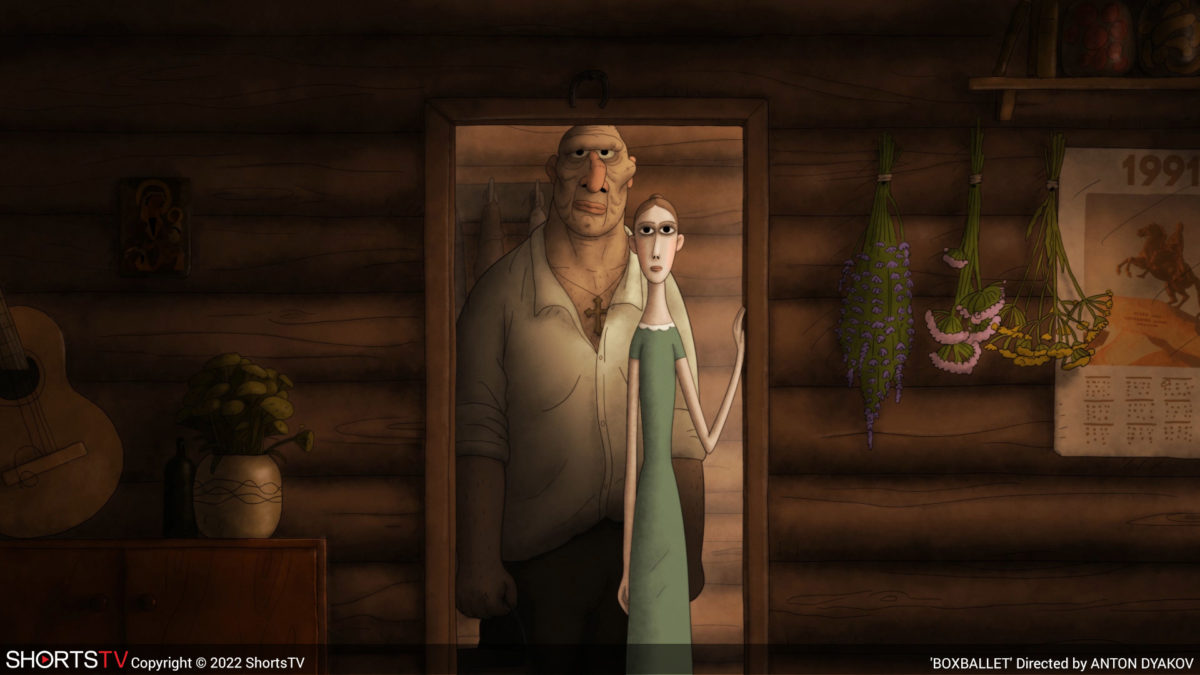
As a coup attempt against Russian President Boris Yeltsin unfolds at the parliament in 1993, a beautiful ballerina named Olga and a beaten-down boxer named Evgeny cross paths on the subway. The encounter lasts but a second, the former not even registering that it had before exiting the train car. If not for his television changing to static after news reports of the violence on the streets (147 were killed, 437 others left wounded), that might have been the end of it. Instead Evgeny leaves his apartment to find Olga outside, crying about her cat caught in the tree. Ever the specimen of chivalrous masculinity despite his rough appearance, his pugilist climbs up to retrieve it before falling to the ground. A friendship is born.
Director Anton Dyakov and co-writer Andrey Vasilyev’s BoxBallet continues through cross-cut sequences of her rehearsals and his fights. Olga confronts the lecherous advances of her director, forcing a choice between personal safety and career advancement. Evgeny confronts a shelf-life long-since overdue as younger and better fighters use him as a punching bag to almost comedic effect. (The boxing matches are rendered as stoic fighters being met by lightning-fast fists whether first-person or in profile.) It’s beauty and brawn clashing at a moment of general strife with a sense of anxiety as to whether they can exist in the other’s world. Her wanting to spend time with him as he disappears for the night to track down her purse-snatcher. Him replenishing her sugar with a 50-pound sack.
Thus the question is whether one or the other will take the plunge and try. Even if he decides to get dressed up for her performance or chooses to watch him get bloodied and bruised, the other has to meet them halfway. That’s the struggle. Risk everything you have now for the promise of love? And at a time when all-out civil war might break at any moment with Swan Lake playing on TVs to block all updates about the coup? Nothing concerning this unplanned relationship is simple, yet we wish it could be so his saggy, potato-faced brute and her long-legged, elegant dancer might receive their happily-ever-after against all odds. With each abrupt cut to black, we pray the tides turn.
B-
Robin Robin | UK | 31 MINS
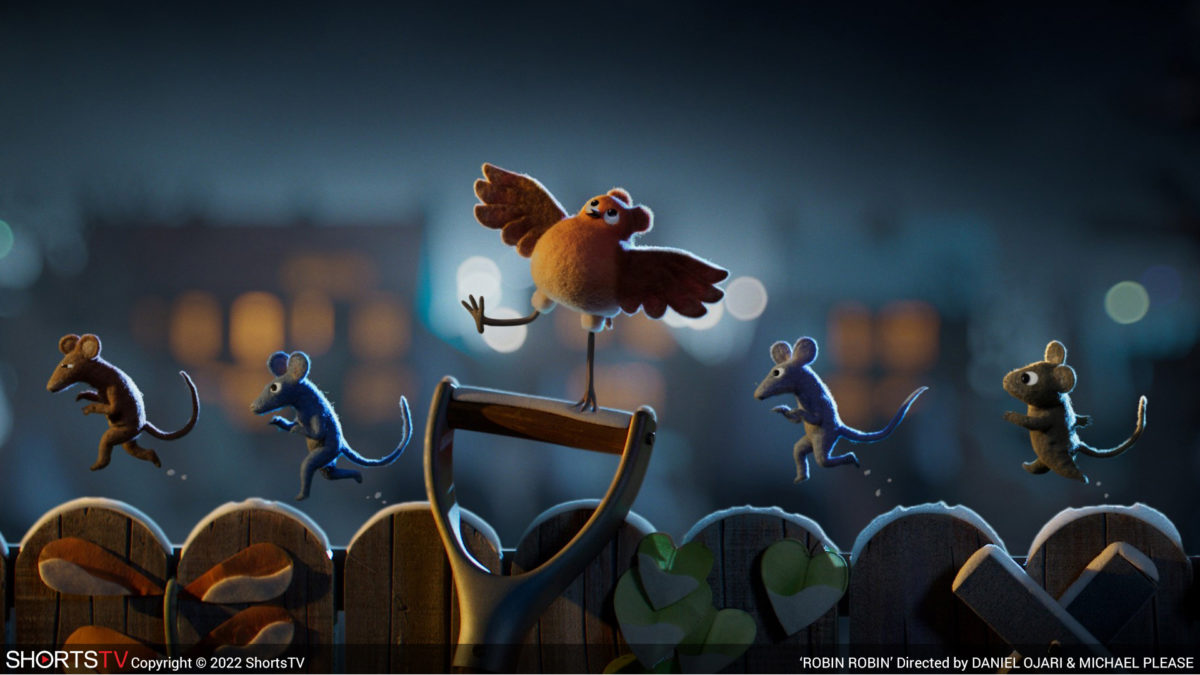
Familiarity means nothing if there’s enough heart. This is especially true with animated films such as Daniel Ojari and Michael Please’s Aardman-produced Robin Robin. We have seen the scenario many times: a lost egg finds its way to the home of a pack of mice on a scary rainy day, forcing Dad (Adeel Akhtar) to bring it inside and ultimately raise Robin (Bronte Carmichael) as his own. Like with most of these oddball situations, that which makes her different from them is initially presented as a flaw (she can’t sneak when breaking into human homes for crumbs) before eventually proving a boon (those wings might come in handy if she ever learns to use them). And that revelation’s drama is both entertaining and endearingly sweet.
As co-written by the directors and Sam Morrison, Robin’s comedic struggles introduce two outsiders to help propel her onto this path of self-discovery. One is a friend: Richard E. Grant’s “things”-obsessed Magpie with a broken wing. The other is a foe: Gillian Anderson’s malicious cat. And it’s an unfortunate set-back where dinner is concerned that brings them all together since Robin hopes to make up for her “mistakes” (an inability to be quiet or careful) by bringing home enough food for the entire family herself. Since sticking to Dad’s plan is hard enough, though, going out alone won’t be much easier due to an unawareness of just how noisy she is—a truth that’s exposed when she tells Magpie to follow her lead. And he does.
The humor is just offbeat enough in parts to resonate with adults while the gorgeous puppetry work (this is Aardman’s first stop-motion production sans plasticine) provides the type of characters and world to steal the attention of any child watching. Ojari and Please aren’t afraid to make the scary parts scary either—Anderson’s feline proves a formidable antagonist with the sort of nonchalant malice of old like the Siamese cats from Lady and the Tramp. We feel the danger when it arrives and revel in the slapstick gags (as well as Magpie’s acerbic quips) used to ensure things never get too dark. Robin is finding the confidence to embrace her identity as both bird and mouse—an evolution of spirit that can overcome anything.
B+
The Windshield Wiper | Spain | 15 MINS
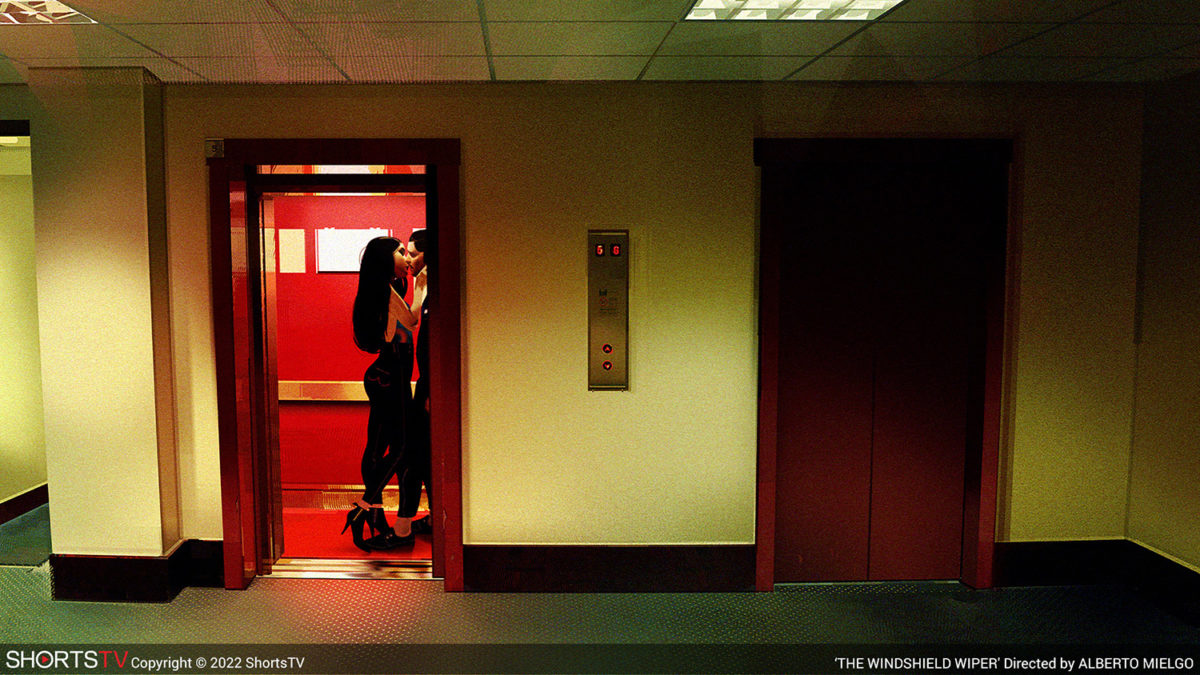
The first thing I thought watching Alberto Mielgo’s short film The Windshield Wiper was that it must be utilizing rotoscoping. Every character populating his multiple vignettes about relationships—all sparked by a chain-smoking gentleman in a bar positing the question “what is love?”—looks and feels real within his / her environments in a way that seems hard to fathom as not having been traced above live-action footage. As soon as you delve into the end credits, however, you see it’s all been 3D-rendered. The scenes are based on memories and eavesdropped moments Mielgo has experienced, but their look and feel are his own interpretations of them. It’s a glorious feat of artistry that ensures the piece is worth a look on aesthetic alone.
That the message it delivers proves so profound almost seems like a bonus despite it being the driving force behind the project. Each glimpse into these characters’ lives is filled with the hope, pain, and desire we’ve all felt. Some of them are devastating (lost love, mixed signals, suicide). Some are familiar and perhaps generic in their matter-of-fact delivery (a shared cigarette on the beach or sex). Some are funny (two Tinder users swiping away as they keep reaching for the same items at the grocery store). And some heartfelt and honest (a drunken homeless man airing out his emotions to a mannequin and asking for forgiveness). Brief interludes (the simplicity of a shared kiss) juxtapose against multi-part narratives to visualize love.
What quantifies it is your reaction to the romance and tragedy alike. There’s purpose to how Mielgo presents each chapter that goes beyond pacing and punchlines. He’s easing us in with silent moments of universality before punctuating the whole with quick bursts of suffering and longing that are no less important to answering that bar patron’s question than the rest. It’s all relevant—the XXX ads surrounding a public phone, the fallen petals of roses in the rain, and the courage to stop and say something to the woman you pass almost every day. They may be objectively different from each other in every conceivable way, but they all become each participant’s entry fee into the rarified space of feeling that indescribable sense to which nothing compares.
A-
Documentary
Audible | USA | 38 MINS
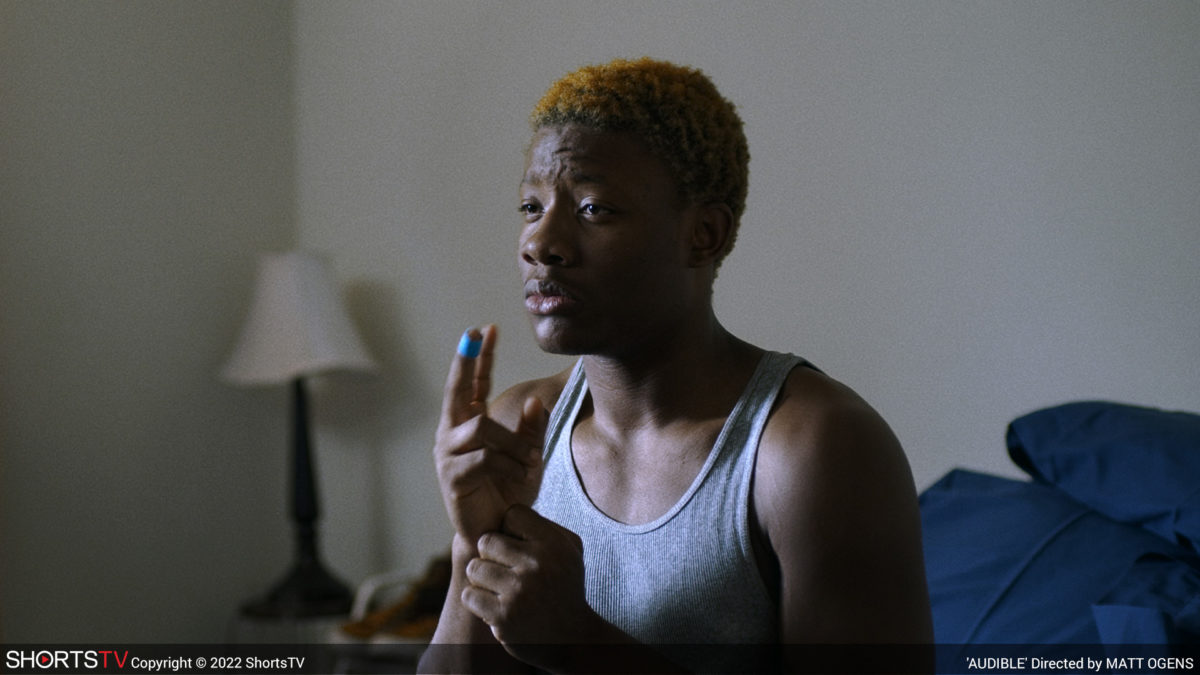
A forty-two-game winning streak is tough to fathom, but that’s what the Maryland School for the Deaf varsity football team was riding as they entered the game that begins Matthew Ogens’ documentary short Audible. It wasn’t just against other deaf schools either. The program had grown into a football powerhouse with a championship pedigree that allowed its athletes a chance to grow together as a community on and off the field. And these kids need that considering everything they face on top of the usual teenage drama of high school. Add the death of a friend to the uncertainty of graduation and no one is feeling that struggle more than senior star Amaree McKenstry-Hall and his friends. This season means more than just what shows on the scoreboard.
It took Ogens over a decade to get this production together—he jokes in interviews that the varsity coach was still a player when he first broached the topic. That it finally solidified in time to document Amaree’s complicated path forward in the face of tragedy probably says more about the hearing world than these kids or the film crew. It makes it seem like it’s not enough to provide a feel-good portrait of perseverance against all odds that normalizes the deaf community as more than victims of a disability. You need extra suffering. Extra adversity. Extra emotions. Does it make the story more compelling as a result? Sure. I do wonder what might have been without that additional weight, but life is never so simple.
The focus therefore turns away from the school and the sport onto Amaree himself. This is a young man who was born hearing before Meningitis took that sense away—and, with it, a scared and troubled father. Amaree subsequently had to grow up amongst an otherwise fully hearing family, the loneliness it provided only being alleviated by the help of his classmates and friends like Teddy. That the latter would end up taking his own life as a result of bullying upon transferring to a hearing school only amplifies just how alone these kids feel when not surrounded by each other and how much further we must go as a nation to dismantle our ablest sensibilities. We have a long way to go for equality on multiple fronts.
Through that tragedy, however, Amaree takes us into the psychological hardships faced as well as the love and support that arrives in its wake. Shot with attractive cinematography juxtaposed against a resonant score, it’s no wonder that Friday Night Lights director Peter Berg is listed as a producer. Above that also lies the open-captioning and immersive sound design that was brought to the mainstream courtesy of Sound of Metal with Ogens putting us into the locker room to experience this loud game in a different way. In the end it all adds up to the word that the art world and Hollywood need to embrace more: representation. Take us into these spaces and show that they’re not defined by what’s lacking. They’re defined by the strength to overcome.
B
Lead Me Home | USA | 39 MINS
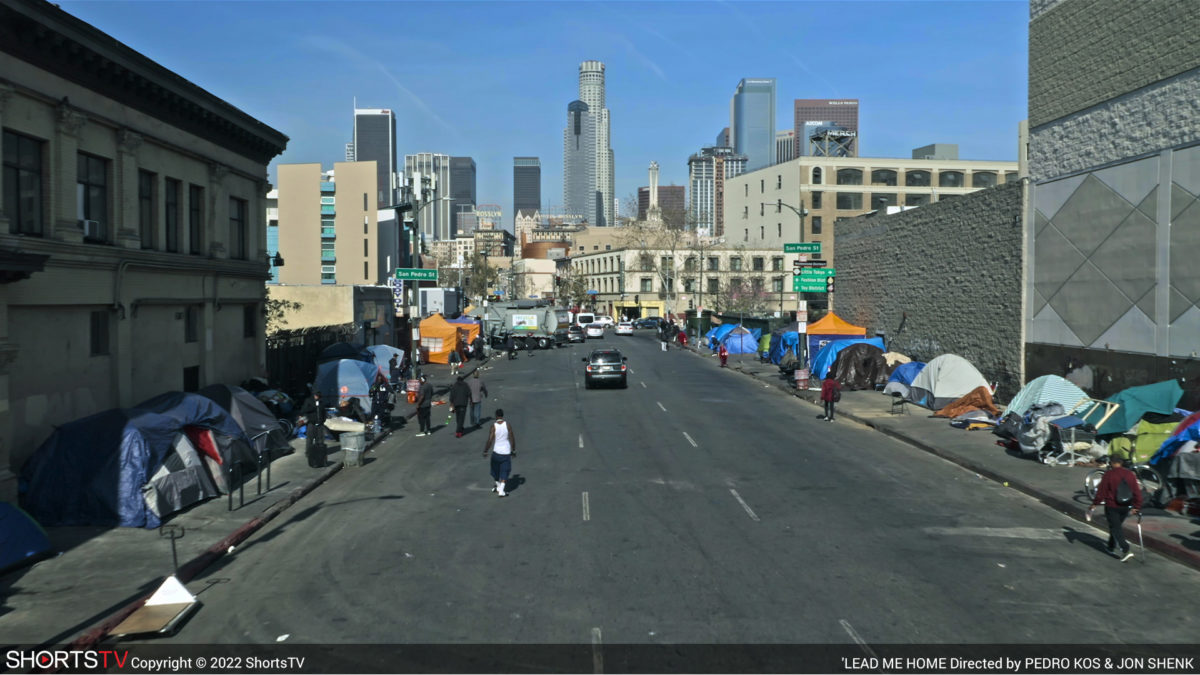
With a statistic like the one that ends Pedro Kos and Jon Shenk’s documentary short Lead Me Home stating how over half a million Americans experience homelessness on any given night, the need to narrow focus and ensure audiences aren’t lost in the futility of numbers rears its head. Because that’s a major issue when it comes to topics such as this. Those who can help simply by lending their compassion to a governmental vote balk at that expansive scope and tell themselves that one person can’t affect change. It’s the same with climate change. We continuously pass the buck onto those with seemingly more resources than us rather than finding the courage to finally take a stand and act. The first step is to humanize the statistic.
That’s exactly what the filmmakers do here by scouring through three years of footage in three different cities (Los Angeles, San Francisco, and Seattle) to highlight a handful of characters that viewers can relate to most. There’s a genial man led by pragmatism. A pregnant mother of two let down by the system that’s supposed to help after leaving an abusive husband. A young couple with a baby on the way trying to keep smiles on their faces. A working woman without any of the reductive earmarks of homelessness who literally leaves her janitorial job to lay on her shelter bunkbed right next door. And the ex-con, the dancer, and a few others who understand a reality that those who don’t too quickly ignore: everything starts with shelter.
Digging into that subject is where the film excels by shining light on the different scenarios proving it true. Like a mother who needs food-stamps to survive so she can afford an apartment losing those stamps once her salary is just enough to pay the rent. You don’t have to look too hard to see the disconnect and realize the complexities of assistance programs beyond hardline rules and regulations. Because as soon as the means for food is removed, the apartment becomes expendable. She can be homeless, but she cannot live without food. To therefore juxtapose her account with town halls railing against new shelters because they will “attract” homelessness is intentionally rage-inducing. Providing beds is how these men and women can deal with the rest.
I would have liked a lot more of that. Instead, we get a couple highly produced montages with melancholic needle drops that really lean into the whole being more advertisement for the film’s website than a substantive entity in its own right. That’s all well and good since having a central hub to educate and offer resources to get involved is great, but the film inherently flirts with exploitative tendencies and manipulations to do so. More than filmmakers desperate to get these stories out into the world, it feels like a polished prospective to wow angel investors more than anything else. That it succeeds despite that is a victory worth noting, but it leaves me wanting more nonetheless because its subjects deserve better than becoming political pawns.
C
The Queen of Basketball | USA | 22 MINS
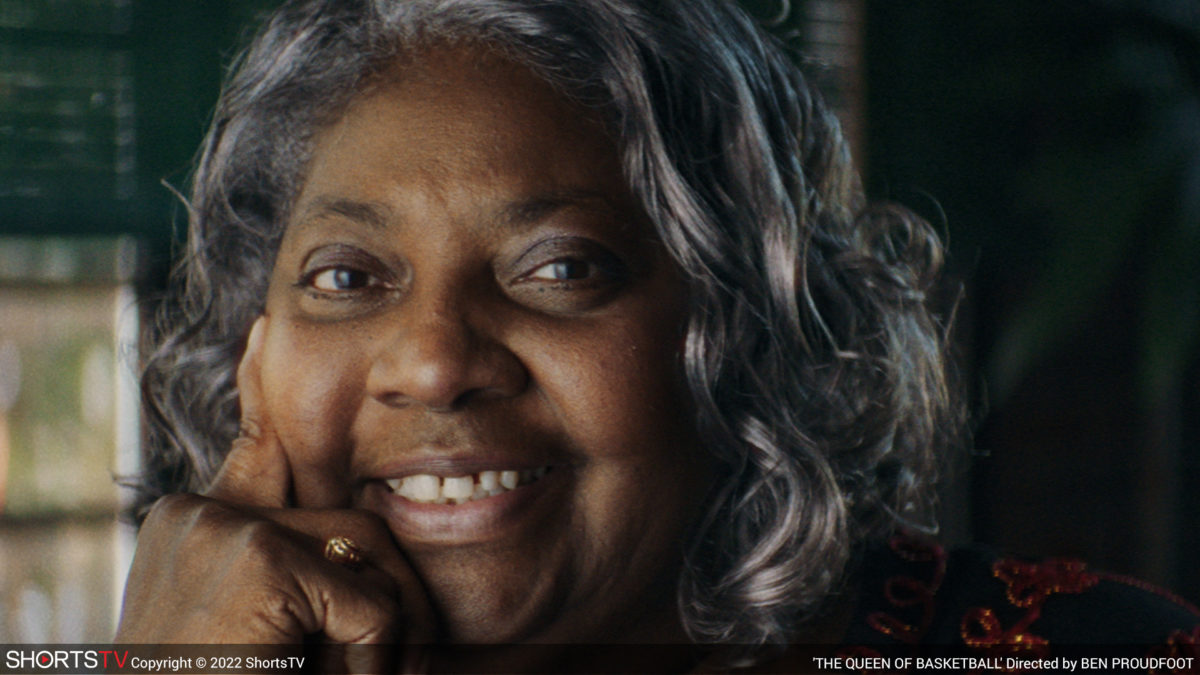
What better way to hear about Lusia Harris than from the woman herself? Ben Proudfoot’s documentary short The Queen of Basketball sees the charismatic former three-time national champion and Olympic silver medal-winning player going through her scrapbook of memories following a rise from daughter of Mississippi sharecroppers to the first woman drafted by the NBA. Did she pursue what was most likely a publicity stunt? No. She also doesn’t regret the decision when looking back and seeing who her children have become through choosing family instead. You can’t help wondering what might have been, though, if opportunities like the WNBA existed back then. With nowhere to go in the sport but coaching after college, those multi-million-dollar endorsement contracts never came her way. Gender equality only went so far.
That’s the gradual nature of paradigm shifts. Just because Title IX was signed to give teenage girls the opportunity to play high school and college ball didn’t mean society or sponsorships were ready to provide them a viable professional platform to continue their journeys. It didn’t matter that her school of Delta State was selling out women’s games while the men’s weren’t. It didn’t matter that she and the team were written up in newspapers all over the country or that the influx of money pouring into the university was allowing them to fly to games. There was still that barrier preventing them from that next step and it took a toll on Harris. To watch her smile drop when talk about her late-presenting bipolarism post-career is heartbreaking.
Her sacrifices and roadblocks helped pave the way for today’s women stars, though. She was a pioneer that gave young girls a role model who looked like them. Where Lusia would stay up late under a blanket to watch Oscar Robinson play on TV, they had “Queen Lucy” to think about instead and all the accomplishments she achieved. Late-70s college basketball is about Bird, Magic, and Lucy now. And with a fast-paced full-court press of its own, Proudfoot’s film expertly splices archival footage with her animated anecdotes and infectious laugh to ensure no one will ever forget that truth. It’s an inspirational and candid conversation with a basketball legend that both reminds us how far we’ve come as well as how much further we must go.
B+
Three Songs for Benazir | Afghanistan | 22 MINS
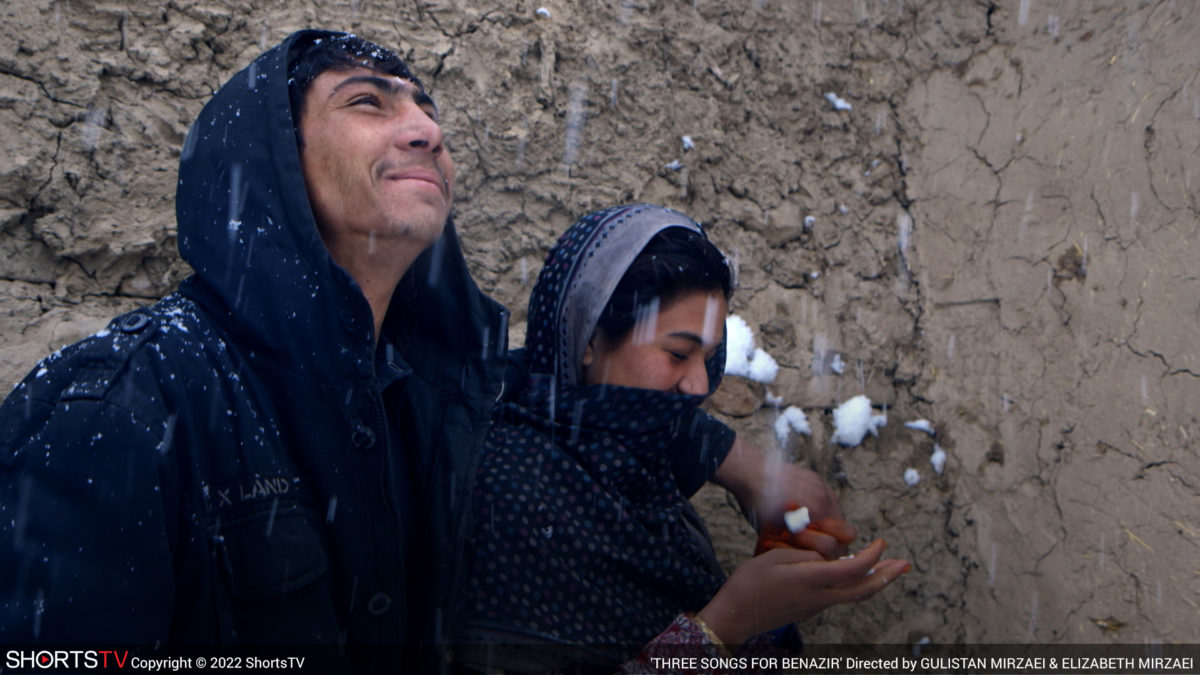
Shaista wants to make his family-in-the-making proud, but options are limited considering he’s uneducated and locked in a war-time displacement camp in Afghanistan. Forming bricks to sell to his neighbors isn’t enough and working in the opium fields leaves too much to chance. So, his desire is to join the National Army and prove himself worthy of a well-paying job despite his hardships. While we never hear what his pregnant wife Benazir thinks on the subject—she’s relegated to an audience member, laughing at his silly songs—Shaista’s brothers and elders are very clear on the fact that they won’t help in his pursuit. And you can’t blame them considering enlistment demands guarantors to take responsibility for any wrongdoing that may occur. It’s too big of a risk.
Elizabeth Mirzaei and Gulistan Mirzaei’s documentary short Three Songs for Benazir follows this young man’s attempt to prove to his family that he can be trusted to serve his people well in their name. Yet, as we soon discover, it’s not about trusting each other. It’s about survival from the elements and poverty. It’s about contending with the drone in the sky allowing westerners to spy on them. It’s about the looming threat of Taliban violence. To vouch for him with the military not only puts them on the hook for his potential transgressions, but it also demands they look after his wife and child while he’s gone. Shaista has personal responsibilities that must take precedent above his own pride right now. Unfortunately, those aren’t easily met either.
This is a very brief window into the struggles faced by Afghans who have been forced to flee their homes from the Taliban that includes a lot of information to process. From the emotions that come with feeling betrayed by relatives to the promise of new life to the constant sense of being watched, it’s a futile situation with few answers. The Mirzaeis aren’t trying to provide any, though. They merely want to document these desperate circumstances through the story of one young man fated to suffer the exact plight his family warned him about despite following their wishes instead of his desires. That’s the sad truth of such humanity crises—there are no “good” choices. Sometimes the safest bets lead you to despair quicker than the gambles.
B
When We Were Bullies | Germany/USA | 36 MINS
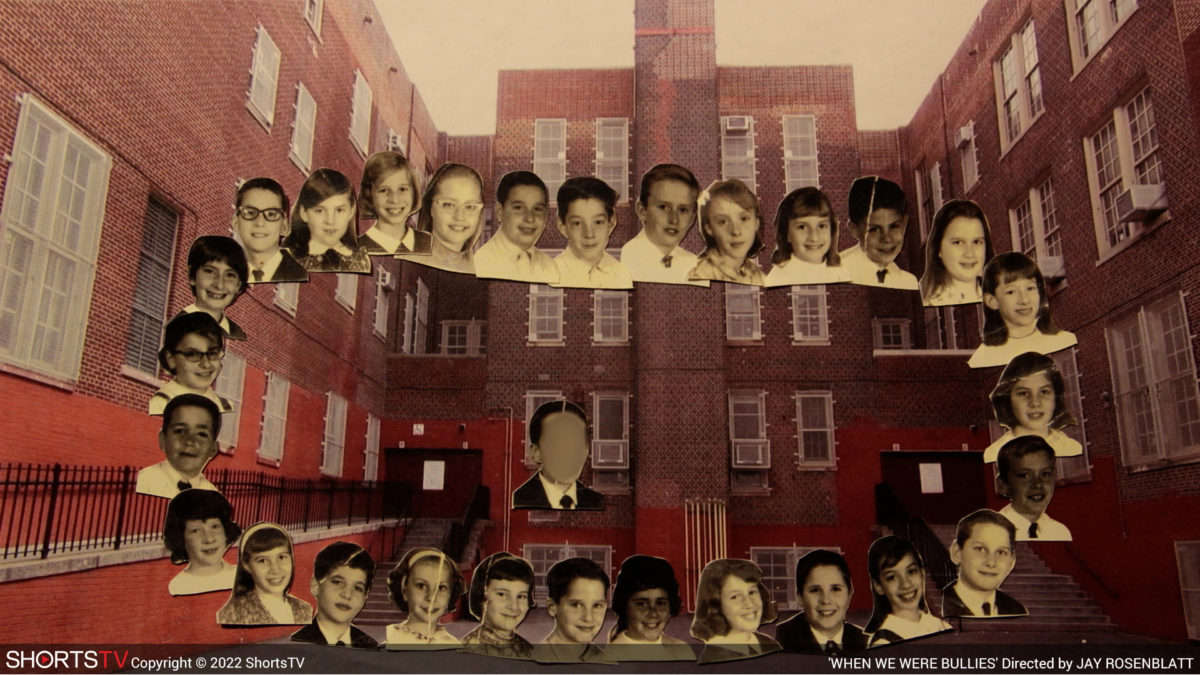
It couldn’t have played out better that the person to give writer/director Jay Rosenblatt the crucial perspective that he remembers the bullying incident at the center of his short documentary When We Were Bullies because of his complicity rather than the incident’s severity was his now ninety-two-year-old fifth grade teacher. How perfect is that? While you could place partial blame on her shoulders for punishing the whole class because of one student’s actions and naming him as the reason, her labeling them “animals” during their next class undoubtably proves a key component to why that complicity hurts so much. Maybe Jay didn’t remember the exact word she used until fellow classmate Richard J. Silberg shared his version of events, but its impact certainly stuck with him.
Just because it remanifests itself through a series of coincidences doesn’t mean the event wasn’t profoundly influential towards who he’s become in the decades since either. A simple three-frame scene in an old educational film cannot catalyze this reaction if it hadn’t. One light punch from a bystander while two boys start fighting is enough to get those feelings of guilt and disgust flooding back into his consciousness? Yes. Because it delivers the toxic masculinity of boys raised to be “men,” the survival instinct to push someone else through the gauntlet of adolescent abuse to save yourself, and the false sense of pride and loyalty that comes with mob behavior. These scars put Jay on a path of reckoning and he stepped forward with open heart and mind.
Part essay film autobiography and part entertaining anecdote, Rosenblatt allows the words and reminiscences speak for themselves against contextually relevant stock footage and Jeremy Rourke’s inventive animations using cutout portraits of the fifth-grade students in question. Those faces circle around their blurred-out victim (making this about “Dick” would be a disservice to them recognizing their actions are what mattered) while the school-yard background separates into multiple pieces or crumples up to lead us to the latest visual segue. Rosenblatt plays with time to keep us engaged (his old teacher isn’t wrong when saying this film could be tedious if presented wrong), letting revelations serve as cliffhangers with the propulsive force necessary to learn more. Some pay-off narratively. Some pay-off thematically. Some are just plain weird (Elementary school reunions?).
It’s a journey of the soul with regrets laid bare that never comes off as fake via over-zealous sentimentality. Jay reconnects with old classmates to talk about the incident and a few of them describe other transgressions at “Dick’s” expense—the sort that can make remorse difficult to fully buy into. Alongside those moments is also plenty of evidence of real contrition with some realizing in hindsight just how damaging their actions could have been. Does knowing “Dick” is now a successful television producer help it all go down easier? Definitely. Yet that knowledge may also allow Jay to dig further and demand honesty rather than try glossing over intent. This is an important topic deserving that truth. Hopefully the humor helps us absorb it to spark change.
A
Live-Action
Ala Kachuu – Take and Run | Switzerland | 38 MINS
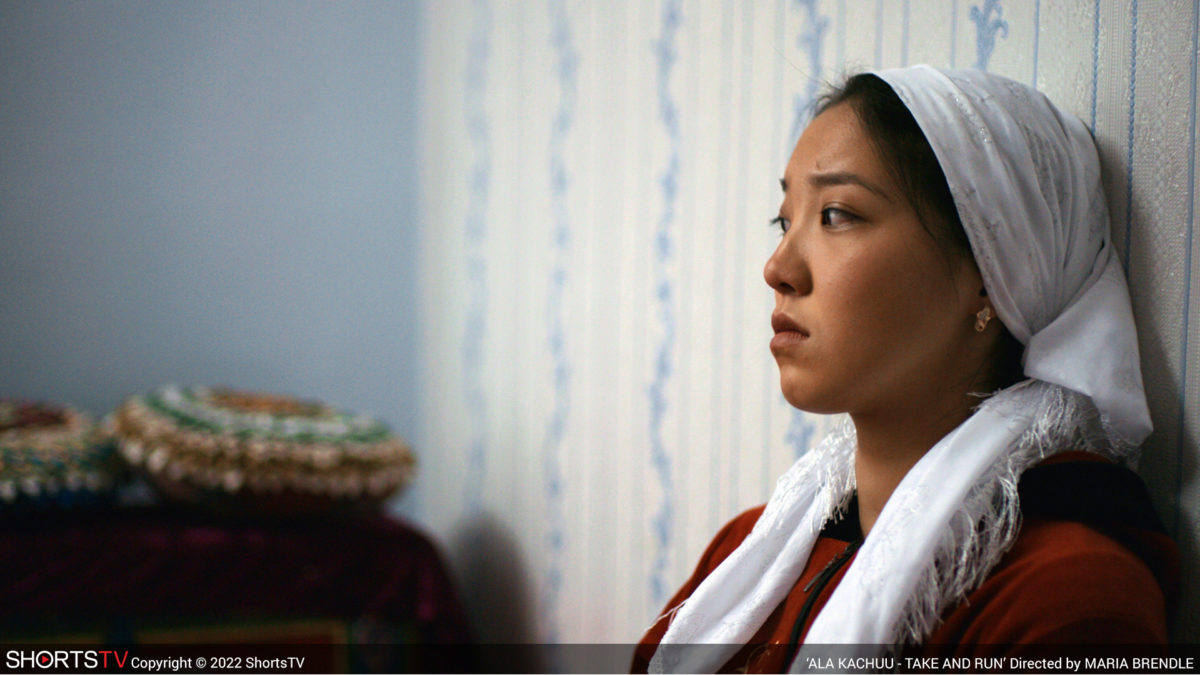
It’s always tough to process a film so steeped in conservative traditions completely unlike my own because it’s often difficult to fully comprehend the complexity. Maria Brendle’s short Ala Kachuu [Take and Run] is no exception considering how futile its depiction of life for women in Kyrgyzstan proves. A faulty feedback loop is created wherein one tragic hardship is transformed into a “lesser evil” when compared to another, unintentionally projecting a message in stark contrast to the work’s goals. The idea here is to show university-hopeful Sezim’s (Alina Turdumamatova) strength and desire to fight back against the patriarchal norms of her culture. So, when she’s ultimately punished for daring to try, we’re forced to wonder if we’re being told that acquiescence to oppression is somehow the better choice.
I know that’s not the case, but it lingers there anyway because the rural-based characters on-screen are so entrenched in believing it. If Americans find it impossible to grasp why their parents’ generation is so adamantly against easing burdens they faced when they were younger (see arguments against dissolving student loans because our greedy society can’t process the reality that some people deserve restitution others no longer need), they’ll never wrap their heads around a mother-in-law and grandmother-in-law telling Sezim everything will be okay because they too were kidnapped and forced into marriage thanks to the indoctrinated cultural blackmail of sacrificing one’s own wellbeing and happiness for that of familial “honor.” Having your hopes and dreams taken away as a rule should never be the cost of living.
There cannot be a happy ending for Sezim as a result. Not unless she escapes Kyrgyzstan altogether. If Brendle’s film tells us anything, it’s that no woman is safe. It doesn’t matter if you’re in the country amongst relatives demanding you marry after high school or in the city under a presumed veil of liberal safety. You can be snatched and forced into a scenario against your will in both places and the fear of consequences that would pale in comparison to an American onlooker (being called a whore, being ostracized, disgracing your family name) is sadly enough for those who should be on your side to instead turn and walk away. Thankfully, Sezim never stops fighting. She might end up dead, but she will not give up.
That’s where this story’s power lies. That’s why the notion that we’re being told Sezim should have stayed home and suffered a similar fate with eyes open is false. Brendle could have gone that direction. This could have been a propaganda piece scaring young girls into listening to their parents because nightmarish horrors await if you don’t. By imbuing Sezim with the autonomy and unflappable perseverance to stare it all down and refuse to waver from a stance of death being the better alternative to staying in a union built upon rape, the film instead reveals itself to be a damning treatise on a people in desperate need of change. It provides viewers a hero unwilling to give up on herself even if her country already has.
B
The Dress | Poland | 30 MINS
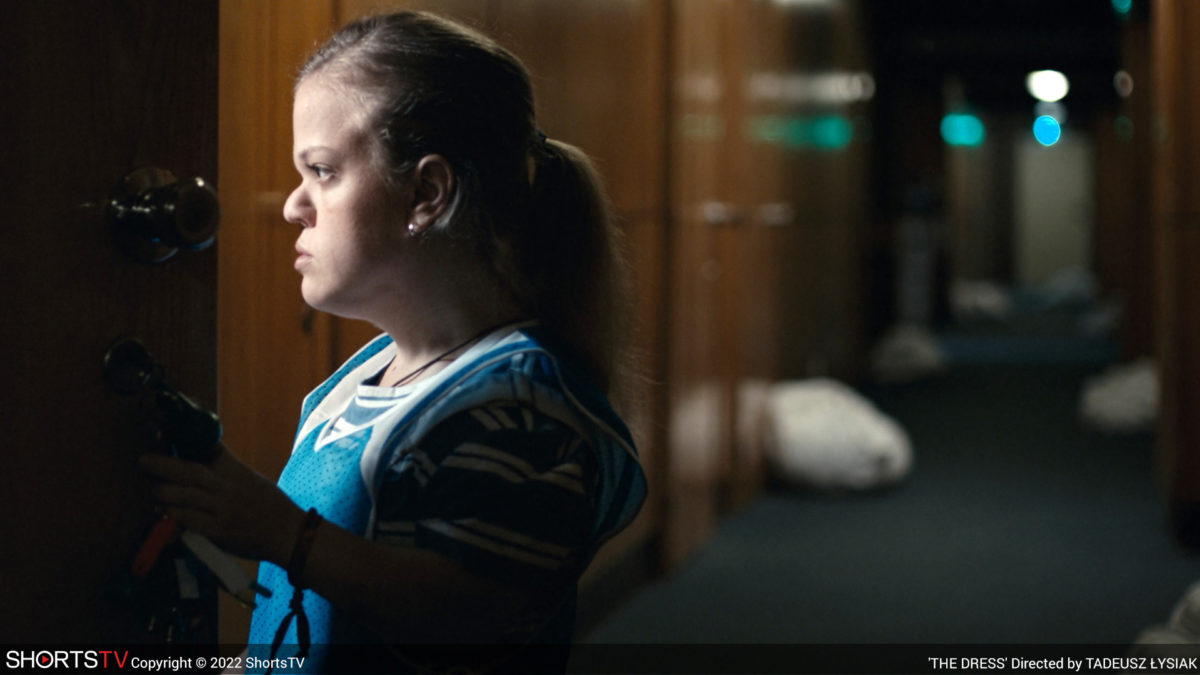
Sitting alone at a slot machine, Julka (Anna Dzieduszycka) feels the brunt of sometimes drunken and always insensitive remarks thrown her way by locals and out-of-towners alike. She’s a person of short stature due to dwarfism who has never left her hometown in Poland. At one point Julka speaks about staying not only because it’s where she grew up and where she’s worked as a motel maid for eight years, but also because she wants to make sure her fellow residents see her and learn the lesson that they will not defeat her no matter how hard they try. It’s a choice she obviously stands by, but that doesn’t make it any less lonely. Because staying ultimately stifles her opportunity for more. Maybe that’s all about to change.
Just as Julka confronts her reality as a virgin after watching yet another traditionally beautiful woman walking away with a crass man cracking jokes at her expense, writer/director Tadeusz Lysiak introduces Bogdan (Szymon Piotr Warszawski): a truck driver passing through who stares at her from across the room with a smile. She’s skeptical, of course. The assumption is that his attention is malicious like usual, but they meet the next day and share a cigarette over conversation that proves otherwise. He even tells her that he’ll be back in four days, setting a date for drinks that cannot help but get Julka excited for whatever may result. Friendship? Intimacy? Love? Her mind wanders through all the different glorious possibilities, her previous fears turning into anxiety-fueled hope.
At the center of that emotional whirlwind is her desire for a new outfit, hence The Dress. This article of clothing reveals itself to be more than just that, though. It’s also protection—a means to allow herself a pathway towards “normalcy” insofar as the depictions of romance surrounding her on the beach, balcony, and casino floor. It exposes the resonant sense of inadequacy that she holds when comparing herself to those same people she strives to teach her lesson. But it’s also a façade. Her friend/co-worker Renata (Dorota Pomykala) may be married and a mother, but she’s also a victim of spousal abuse. Those attractive women laughing at dinner are often found crying in the night after what we assume is the same. Julka idolizes them anyway.
And so, we fear the worst while wishing for the best once the days disappear and the date looms upon the horizon. Will Bogdan be everything Julka needs him to be? Or will he prove yet another horrible creature simply interested in using and abusing the women he so dutifully ensnares? Lysiak does a good job holding the potential of these questions at bay for as long as he can before providing his answer, letting Dzieduszycka carry the action with a complex and conflicted performance desperate to not succumb to optimism despite wanting to believe in it so ardently. The result is a well-shot and well-acted drama flirting with miserabilism as it provides its unfortunate truth: our admiration for “beauty” too often only guarantees us pain.
B
The Long Goodbye | UK | 12 MINS
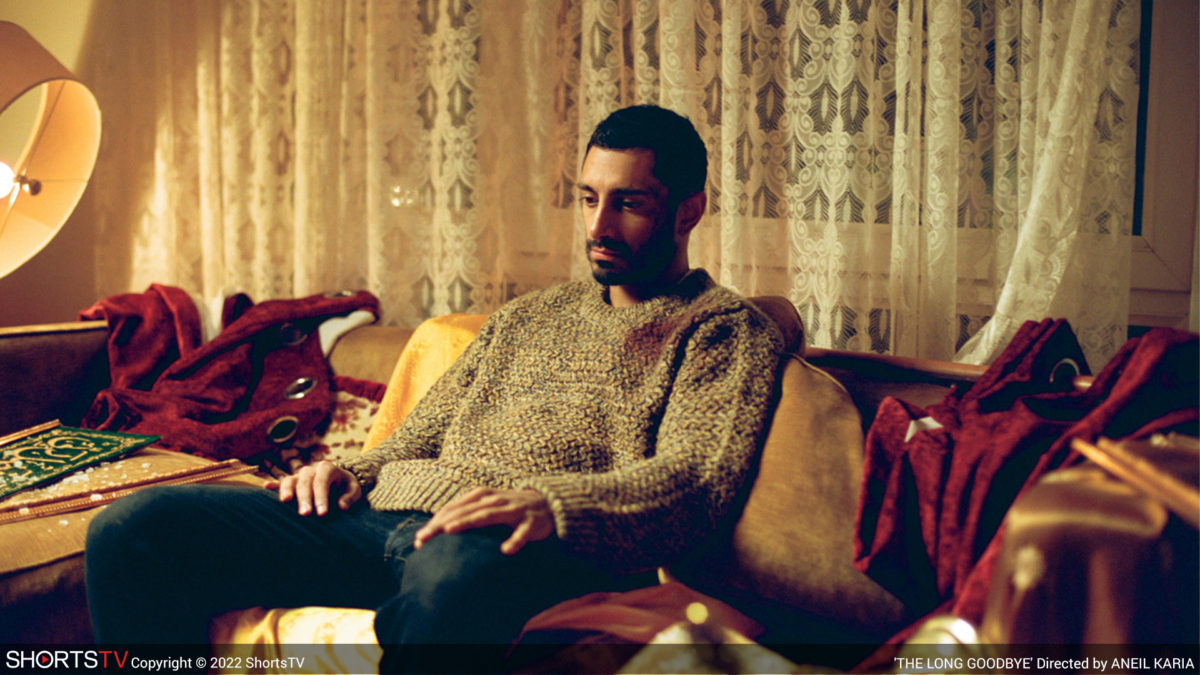
Even before Riz Ahmed (who co-wrote with director Aneil Karia) rises from the pavement to rap his song “Where You From” (also heard in the feature-length film Mogul Mowgli), their short The Long Goodbye feels like a music video. Yes, we hear Ahmed singing other songs in the background as his character’s family prepares for his sister’s wedding, but I mean that more for the energy of the whole than any literal sense of the medium. We can feel that we’re biding time even if we don’t yet know why. Maybe it’s about the far-right march on the television that Ahmed’s father wants to watch. Maybe it’s about the male friend his sister invited to her own wedding. We merely know that a storm is coming.
That dread and anticipation plays like a crescendo. And the climax proves as confrontational and, perhaps, exploitative as you can imagine. This is the point. This is what music videos have been doing for decades—pushing the envelope visually and thematically to provide their message with the blunt force trauma of their lyrical emotion. The first thing that came to mind as the credits rolled was Romain Gavras’ video for M.I.A.’s “Born Free” and its stark, brutal aesthetic where it comes to genocide and terrorism. Karia and Ahmed pull no punches in their depiction of a very real future ahead if white supremacy isn’t curbed soon. This family isn’t surprised when the twenty-first century Nazis arrive. They expected it. It’s not, “Something is happening.” It’s simply, “They’re here.”
Is the result effective? Sure. You cannot watch the happy-go-lucky sensibility of people readying for a celebration evaporating into fearful screams without feeling something—whether a kinship to their dread from anticipating the same happening to you or the shame of knowing you’d be one of the one’s who let it happen. That’s the powerful imagery. The white neighbors gazing through their windows as people they’ve surely invited over to their homes are rounded up like criminals in the street. That’s what lingers as Ahmed spits his truth as a Muslim Brit of Pakistani descent who can’t help but feel like stranger in his own country as pro-white European sentiment grows. He’s throwing nuance out the window to make sure audiences understand what’s happening. He can’t afford confusion.
B-
On My Mind | Denmark | 18 MINS
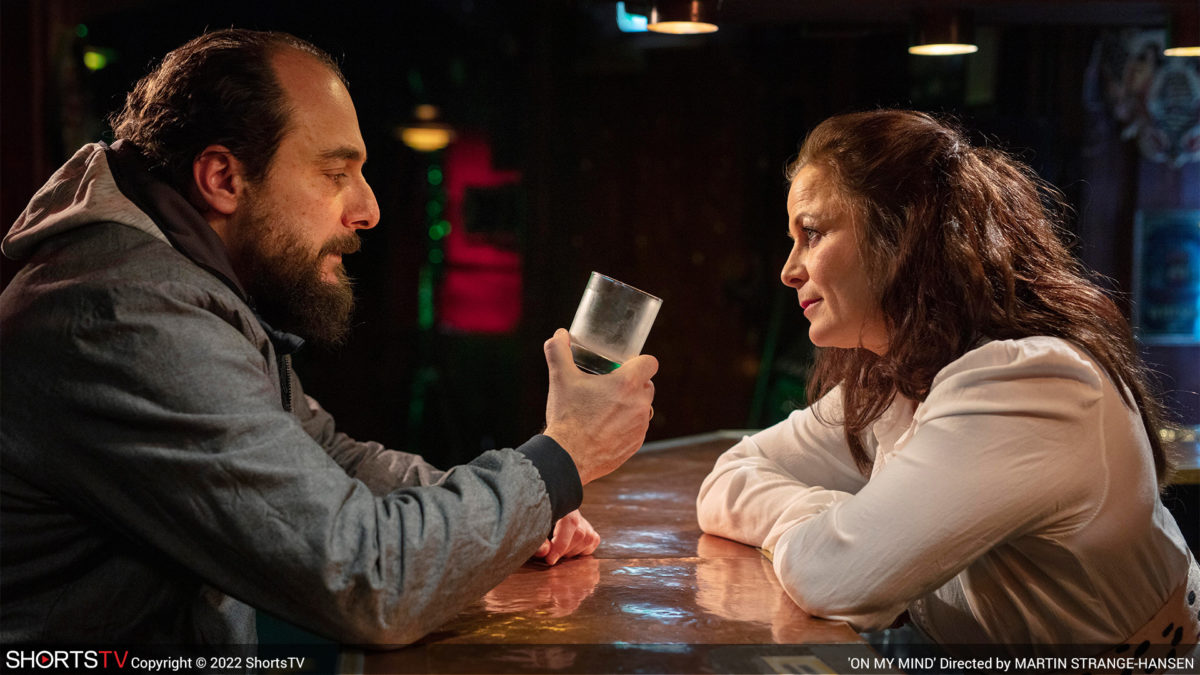
There may not be any surprises where it comes to the plot of Martin Strange-Hansen’s short On My Mind, but there’s a ton of heart. And that’s often all you can ask for when it comes to art. Does the piece touch you on a level deeper than whether you can guess the ending? Do you leave the theater with a smile on your face thanks to the melancholic beauty of a character’s actions? Have the events unfolding on-screen brought forward your own memory of loss and love through the poignancy of its journey? These are Strange-Hansen’s accomplishments upon sending Henrik (Rasmus Hammerich) to a barely opened dive bar this fateful weekday morning. This man seeks to drown his sorrow. He discovers a way to embrace it instead.
What’s great about how it unfolds is its lack of airs as far as trying to pull one over on the audience. Strange-Hansen isn’t hiding a twist. He’s merely allowing this moment to breath insofar as what its content can mean for onlookers. Because, even if it isn’t explicitly spoken aloud, we know bar owner Preben (Ole Boisen) and bartender Louise (Camilla Bendix) are together. The way she endears herself to Henrik to get a rise out of him is more important than the reasons why their customer must sing “Always on My Mind” this instant before it’s too late. This is a moment for Preben to prove that he may have a romantic bone in his body after all—even if he must be guilted into showing it.
Henrik’s act to sing is one of pure love and sound mind. He knows there’s no escaping what’s about to happen and yet he sees a chance to do something that will ease the pain anyway. That Strange-Hansen adds a bit of coincidence (Preben knows the exact number of that song amongst two thousand on a karaoke machine he abhors?) and the supernatural (gusts of wind and handprints on glass giving form to the afterlife) only enhances the experience and ensures we absorb it as the parable for never taking your happiness for granted that it is. Because if Henrik can still find hope and grace in death, we should all be able to see them and embrace them in life. Even a surly old curmudgeon like Preben.
A
Please Hold | USA | 19 MINS
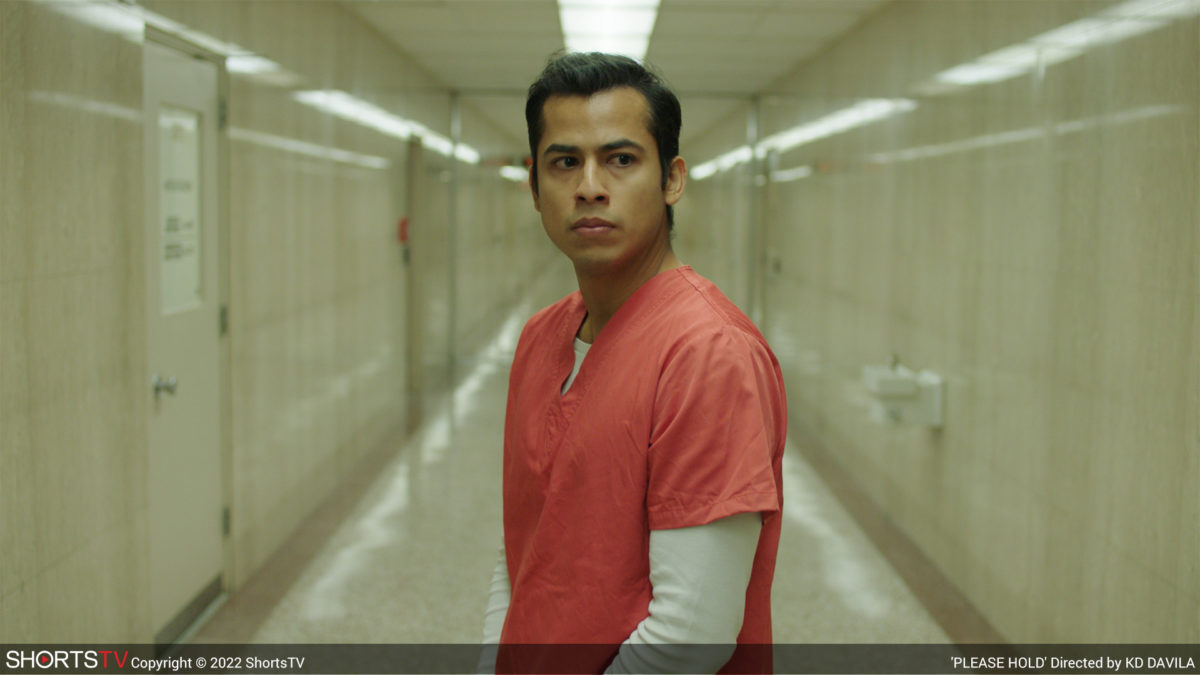
After the debacle that was Don’t Look Up, it’s nice to know satire is alive and well courtesy of KD Davila’s short film Please Hold. Where the former refuses to acknowledge its thinly veiled metaphor for what just happened in America during the COVID-19 crisis (choosing to willfully pretend as though it’s hypothesizing a future, unrelated tragedy instead), the latter knows exactly what it’s doing. Because while the idea of an automated justice system stripping human beings of their right to know what they’re being accused of doing is something to fear, the reality is that the experience Mateo (Erick Lopez) endures is already something poor Americans know all too well. Thanks to for-profit prisons taking over the incarceration industry coast-to-coast, these paywalls have been active for years.
Davila and co-writer Omer Levin Menekse wouldn’t have achieved the same impact had they just created a film about a wrongfully accused man being forced to choose between the risk of losing decades of his life by going to trial and agreeing to plead guilty (despite his innocence) so he can mitigate the damage this mistake has caused. Why? Because the public is apathetic. Half the population believes that someone can only be arrested in error because they’ve allowed themselves to be put in a situation where that error can be made. They don’t consider profiling. Identical names. Religious persecution. Or the big one: a corrupt law enforcement system. To truly reach audiences that have already made up their minds, one must deflect with a comedic delivery device.
And the one they create is brilliant. Rather than a disinterested cop ignoring Mateo’s declaration of innocence, he’s confronted by an airborne drone holding a gun and taser. Put the cuffs on and follow it to the precinct or be incapacitated. The result might be the same, but at least he’s conscious for one with the opportunity of finding a human offering clarity. Except there aren’t any humans. One drone passes Mateo to the next. Instead of answering his legitimate questions (What am I accused of doing?), they say “Comply or be hurt.” So, he compiles. He discovers the only way to acquire information is to pay exorbitant amounts of money on a lawyer and that if he misspeaks, the cartoon public defender may enter the wrong plea.
It’s a dystopian nightmare of epic proportions because it doesn’t take long before that intentionally dangled, rotting carrot of a choice between a lesser sentence and risking life in prison becomes everything to Mateo’s future. The sweatshop-by-way-of-meal-kit-economy parody is a nice touch, but the infinity loop of selective dialogue is the real horror. Because that’s our current world. That’s every citizen video of a police officer saying he/she doesn’t have to give a reason for his/her actions. Davila’s vision is of a present too many of us are too privileged to acknowledge exists. Switch prison and lawyer fees with cancer and medical costs and you get the same result. Automation isn’t the villain. Our indifference to the plight of the disadvantaged has already turned us into the robots.
A-
ShortsTV presents the Oscar® Nominated Short Films globally in theatrical and virtual cinemas starting on February 25, 2022. To learn more about the participating theaters (in-person and virtually) and how to purchase tickets, please visit here.
